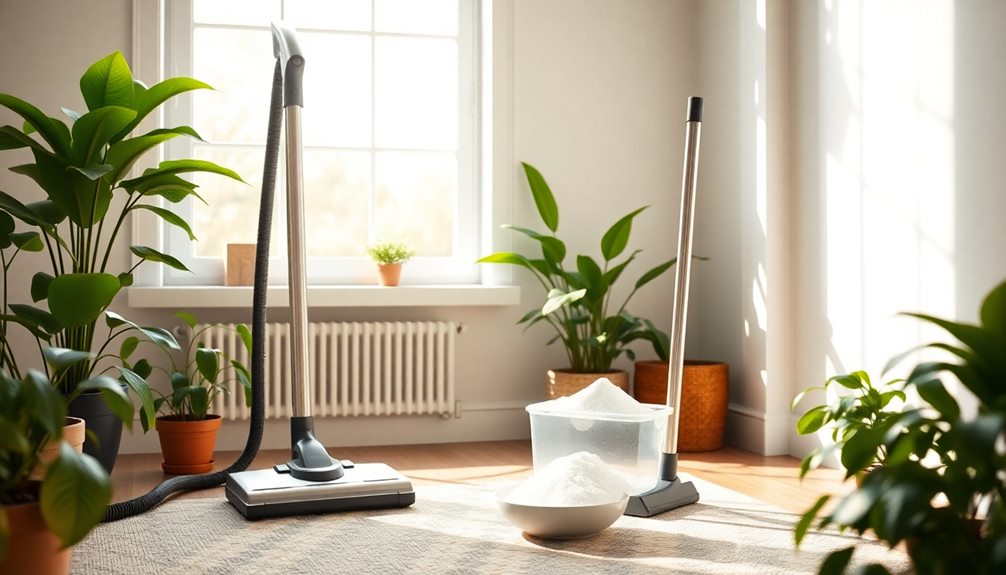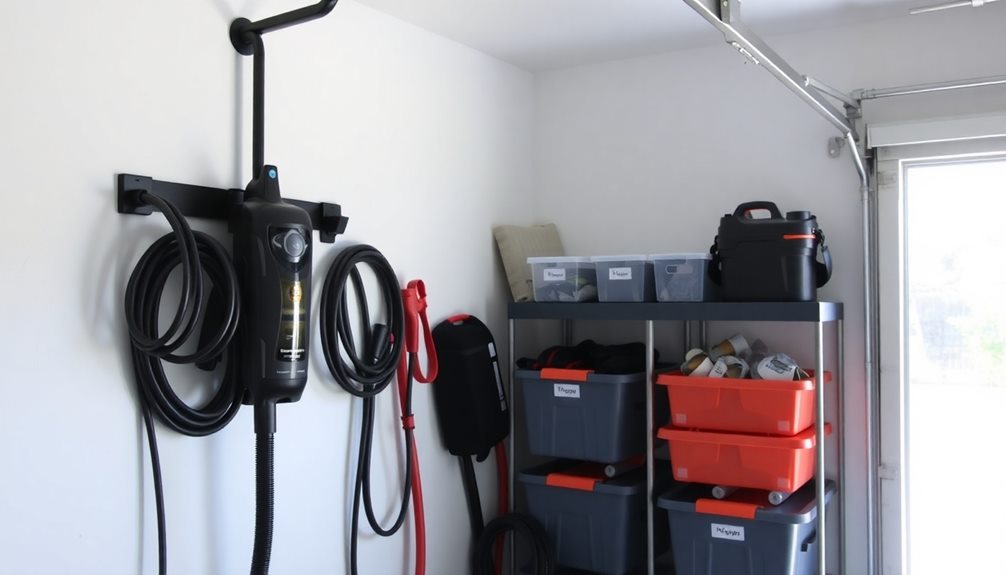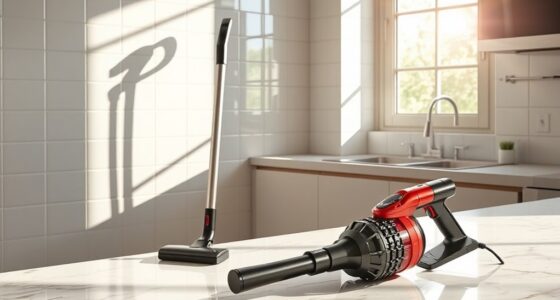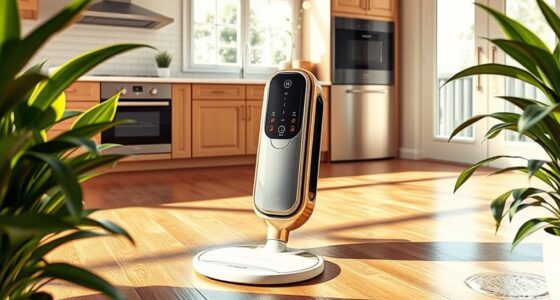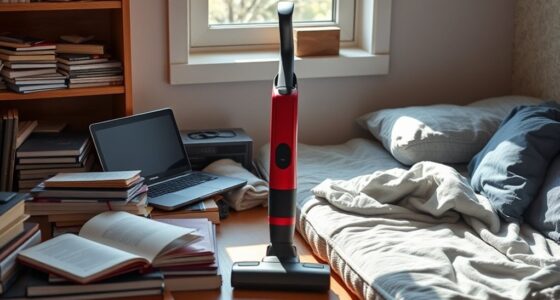To stop your vacuum cleaner from smelling, start by emptying the dustbin after each use to prevent debris buildup. Clean or replace the filters every month to avoid odors caused by trapped dirt and moisture. Additionally, inspect hoses and brushes for clogs that can contribute to smells. You can also sprinkle baking soda in the vacuum bag or dustbin to absorb odors. If the smells persist, consider using a vinegar solution to clean the machine's interior. These simple steps can keep your vacuum fresh, and there's much more you can do to maintain it effectively.
Key Takeaways
- Regularly empty the dustbin after each use to prevent debris buildup and unpleasant odors.
- Clean or replace filters monthly to maintain optimal suction and reduce mold growth.
- Use baking soda or vinegar solutions to deodorize and disinfect vacuum components.
- Inspect and clean hoses and brush rolls to eliminate clogs that cause smells.
- Consider replacing your vacuum if persistent odors or overheating issues remain despite maintenance.
Causes of Vacuum Smells
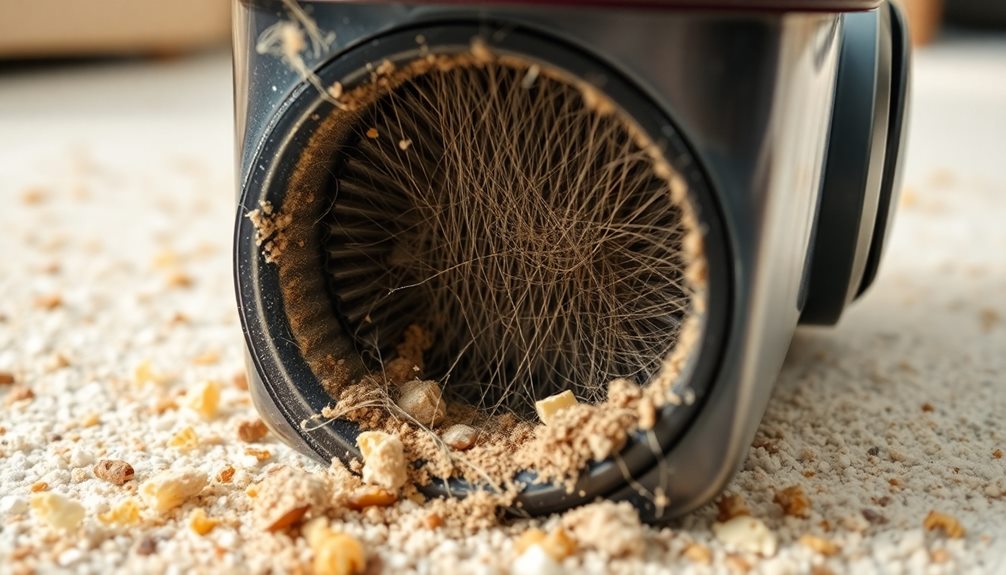
Vacuum cleaners can develop unpleasant smells for several reasons, and understanding these causes is important to keeping your home fresh. One common culprit is the buildup of debris, including pet hair, food crumbs, and organic materials. As these items decompose, they emit foul odors that can linger in your vacuum.
Additionally, mold growth can contribute to musty smells, particularly when moisture accumulates in the collection container or filters.
Clogged filters are another major issue. When filters trap dust, allergens, and bacteria, they can lead to unpleasant odors and reduce your vacuum's efficiency. Regular maintenance, such as emptying the dustbin and cleaning components, is vital to prevent these odor issues. If you neglect these tasks, the smell will only worsen over time.
Pay close attention to your vacuum cleaner smells; they often signal deeper problems that need addressing. By identifying the causes, like debris accumulation and mold growth, you can take proactive steps to keep your vacuum—and your home—smelling fresh.
Regular upkeep won't only improve your vacuum's performance but also enhance the air quality in your living space.
Mechanical Issues and Odors
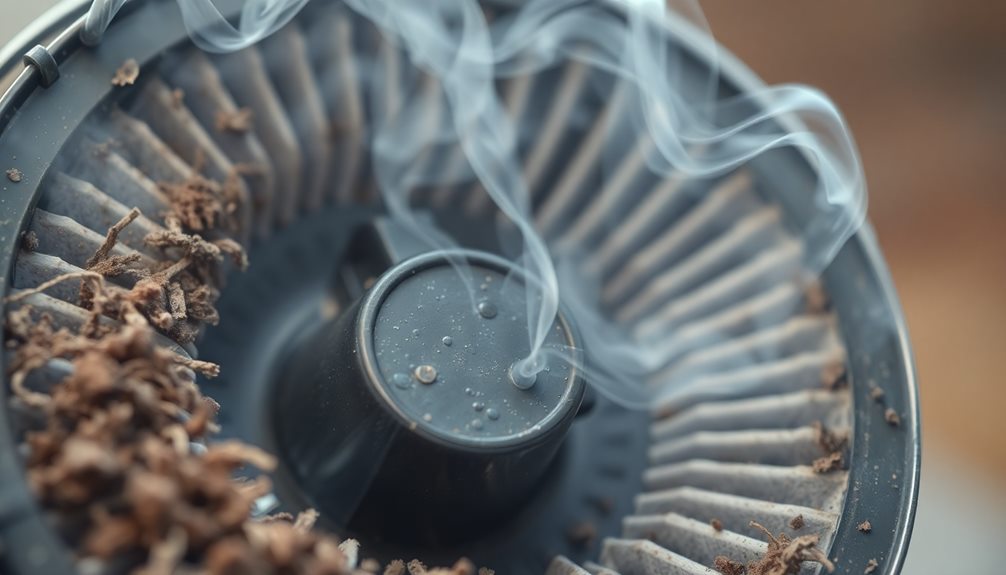
If your vacuum cleaner starts emitting strange smells, it could be a sign of mechanical issues like an overheating motor or clogged filters.
These problems not only affect performance but can also lead to unpleasant odors from trapped dirt and debris.
Regular maintenance can help you avoid these issues and keep your vacuum running smoothly.
For instance, ensuring that you choose a vacuum with a superior filtration system can drastically reduce the accumulation of dust and allergens, which can contribute to odors in the first place.
Consider exploring the best vacuums for dust removal in 2024 for effective cleaning solutions.
Overheating Motor Concerns
Overheating motors can really throw a wrench in your cleaning routine, often resulting in a burning smell that's hard to ignore. When your vacuum's motor overheats, it usually means there's an issue that needs your attention.
Clogged filters and obstructed airflow are common culprits, putting extra strain on the motor and causing that unpleasant odor. Regular maintenance of your vacuum not only helps prevent overheating but also improves indoor air quality, which is especially important since air purifiers can effectively reduce allergens.
To keep your vacuum running smoothly, make it a habit to inspect and clean the filters and hoses frequently. This simple step can greatly reduce the chances of overheating. Don't forget about the vacuum belt, either—a worn or stretched belt can also lead to motor issues, so check it regularly and replace it when necessary.
If you're still experiencing persistent burning smells despite your maintenance efforts, it's time to consult a professional. They can perform a thorough inspection of the motor and other internal components to identify any underlying problems.
Clogged Filters Impacting Odor
A clogged filter can greatly impact your vacuum's performance and lead to unpleasant odors. When filters trap dust, allergens, and moisture, they create an environment ripe for mold growth, contributing to foul smells during operation.
To keep your vacuum smelling fresh, it's essential to stay on top of filter maintenance.
- Clean or replace filters every 1-3 months.
- Maintain optimal airflow to uphold efficiency.
- Check for clogs that can reduce suction power.
- Avoid overheating, which can lead to burnt smells.
- Keep an eye out for signs of mold growth.
Ignoring filter maintenance not only results in unpleasant odors but can also pose health risks. When you neglect to replace filters, your vacuum has to work harder, which can lead to overheating and more significant mechanical issues.
By taking simple steps to maintain your filters, you'll prevent unpleasant odors and enhance your vacuum's performance. Regularly addressing clogged filters guarantees you enjoy a cleaner home and a more efficient vacuuming experience.
Don't let foul smells dictate your cleaning routine—stay proactive and keep your vacuum in prime condition!
Troubleshooting Odor Problems
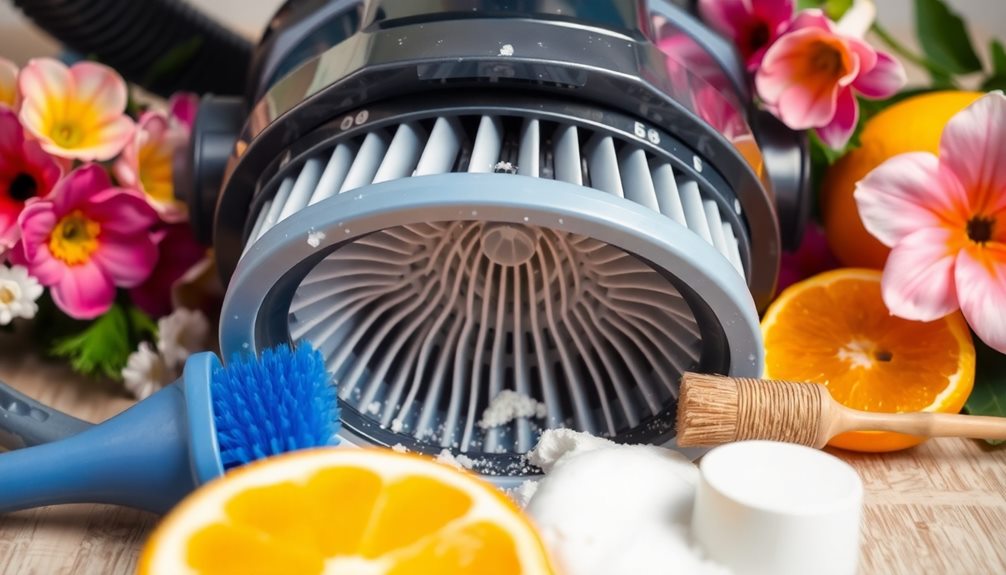
To tackle odor problems with your vacuum cleaner, you need to identify common sources of smells and implement regular maintenance practices.
Keep an eye on the vacuum bag or bin, filters, and hoses, as these areas can trap debris and odors.
Identify Common Odor Sources
While vacuuming can help keep your home clean, it can also lead to unpleasant odors if certain common sources aren't addressed. Identifying these sources is important for maintaining a fresh-smelling vacuum and a pleasant home environment.
- Accumulation of debris: Neglecting to empty the dustbin or change the bag allows organic materials like food crumbs and pet dander to decompose and produce foul odors.
- Clogged filters: When filters get clogged, airflow is restricted, trapping odors inside. Regularly cleaning or replacing filters is essential.
- Pet hair and dander: In homes with pets, hair and dander can accumulate quickly, leading to bacteria growth and unpleasant smells. Keeping brushes and rollers clean is critical.
- Moisture and mold growth: If your vacuum is exposed to damp conditions or used on wet surfaces, it can trap moisture, promoting mold that emits musty odors.
- Worn or damaged components: Inspect belts and hoses for wear; damaged parts can lead to overheating and burning smells.
Regular Maintenance Practices
Once you've identified the common odor sources, implementing regular maintenance practices can greatly help troubleshoot and prevent these issues from arising. Here are some essential steps you can take to guarantee your vacuum stays fresh:
| Maintenance Task | Frequency | Purpose |
|---|---|---|
| Empty vacuum bag/container | After each use | Prevents buildup of debris |
| Clean or replace filters | Monthly | Guarantees suction and reduces odors |
| Inspect hoses and brushes | Monthly | Eliminates clogs and trapped debris |
| Wash removable parts | Monthly | Removes residue and prevents odors |
| Use deodorizing solutions | Each use | Neutralizes odors while vacuuming |
When you maintain your vacuum regularly, you'll eliminate odors lurking inside your vacuum. Always remember to clean or replace vacuum filters as recommended by the manufacturer. Inspect and clear any clogs in the hoses and brushes to guarantee a smooth operation. By washing removable parts with warm soapy water at least once a month, you can effectively prevent odors from developing. Incorporating these practices will keep your vacuum running efficiently and smelling fresh every time you use it.
Effective Deodorizing Techniques
If you notice persistent odors even after maintaining your vacuum, implementing effective deodorizing techniques can make a significant difference. Here are some methods to help tackle those unpleasant smells:
- Baking Soda: Sprinkle 1-2 tablespoons into the vacuum bag or dustbin before use. It effectively absorbs odors while you clean your vacuum.
- Vinegar Solution: Mix equal parts vinegar and water to clean vacuum components. This neutralizes lingering smells and disinfects surfaces.
- Essential Oils: Add a few drops of essential oils, like lavender or lemon, to the vacuum bag or filter. This provides a pleasant scent while you vacuum, making the experience more enjoyable.
- Odor-Absorbing Beads: Incorporate odor-absorbing beads designed for vacuums into the dust bag or canister. They help maintain freshness between cleanings.
- Regular Maintenance: Remember to empty the vacuum bag or bin after each use. Cleaning filters regularly prevents odor buildup from trapped debris.
Maintenance for Odor Control
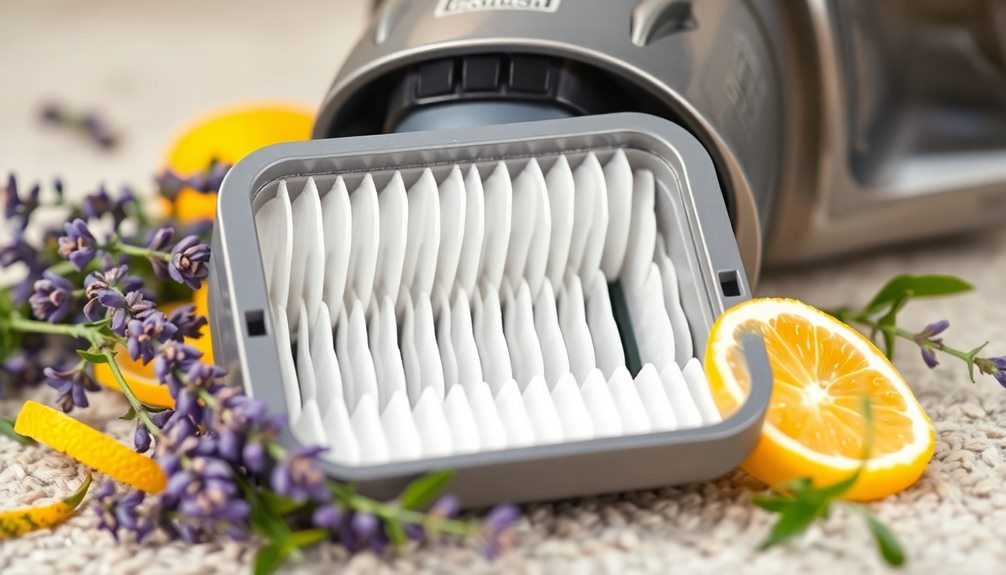
To keep your vacuum cleaner smelling fresh, regular maintenance is essential. Start by emptying the dustbin or replacing the dust bag after each use. This simple step helps prevent the buildup of decomposing debris that can lead to unpleasant odors.
Additionally, you should clean or replace the vacuum filter at least every few months. Clogged filters trap odors and can diminish air quality inside of your vacuum.
Every few weeks, inspect and clean the brushes and rollers to remove hair and debris. These components can contribute to unwanted smells if not maintained.
For extra odor control, consider adding baking soda to the dustbin or dust bag. It's a natural deodorizer that effectively neutralizes smells.
Deodorizing Techniques
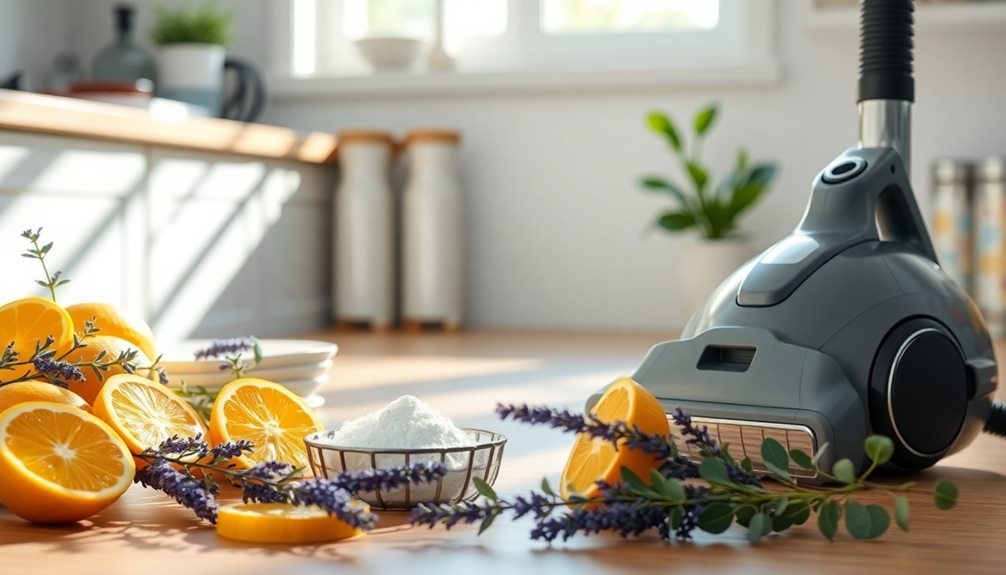
There are several effective deodorizing techniques you can use to keep your vacuum cleaner smelling fresh. By incorporating these methods, you'll guarantee your vacuum doesn't contribute to any unwanted odors while cleaning.
Regularly maintaining your vacuum's performance can also help reduce odors, as a well-functioning vacuum tends to trap dirt and allergens more efficiently, enhancing indoor air quality and prolonging carpet life, as discussed in vacuum cleaner performance metrics.
- Baking Soda: Sprinkle 1-2 tablespoons of baking soda into the vacuum bag or canister before use. It absorbs unwanted smells, keeping your vacuum smelling fresh.
- Essential Oils: Add a few drops of your favorite essential oil, like lavender or lemon, to the vacuum filter or bag. This infuses a pleasant scent while you clean.
- Vinegar Solution: Mix equal parts of vinegar and water, then lightly spray this solution onto vacuum components. Let them air dry to eliminate lingering odors and disinfect surfaces.
- Commercial Deodorizing Sprays: Use specialized vacuum deodorizing sprays, applying them to the vacuum's filter or bag following product instructions for peak freshness.
- Fragrant Dryer Sheets: Place a scented dryer sheet inside the vacuum bag or canister. This helps mask any unpleasant smells while you're vacuuming.
Implementing these deodorizing techniques can help keep your vacuum smelling fresh and inviting every time you use it.
Specific Solutions for Dyson
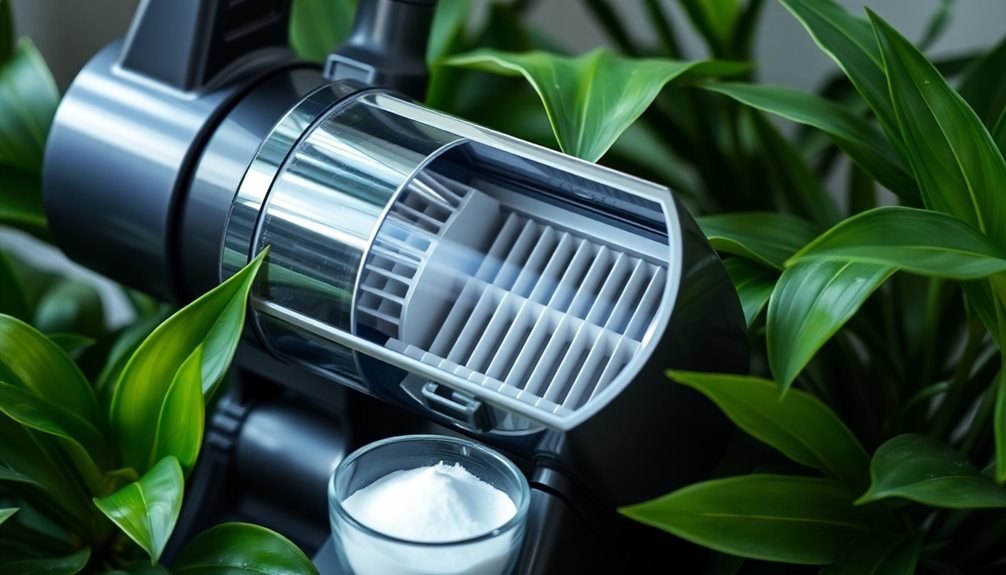
Dyson vacuums are known for their powerful performance, but without proper care, they can develop unpleasant odors. To keep your bagless vacuum smelling fresh, you should regularly empty the collection container after each use. This prevents the buildup of debris, pet dander, and dust that can lead to vacuum smells.
Make it a habit to clean the washable filters under lukewarm water every month. This removes trapped dust and bacteria that contribute to unpleasant odors. Just make sure they dry completely before reinstalling them.
To tackle smells inside the vacuum, mix vinegar and water to scrub the interior surfaces and the collection container. This helps neutralize any lingering odors effectively. You can also consider adding scented dryer sheets or a few drops of essential oils to the filter or collection container for a pleasant fragrance while you use your vacuum.
If you still notice persistent odors, inspect the hoses and brush rolls for clogs. Cleaning these thoroughly will eliminate trapped debris and help maintain a fresh-smelling vacuum.
With regular maintenance, your Dyson can stay odor-free, enhancing your cleaning experience.
When to Replace Your Vacuum
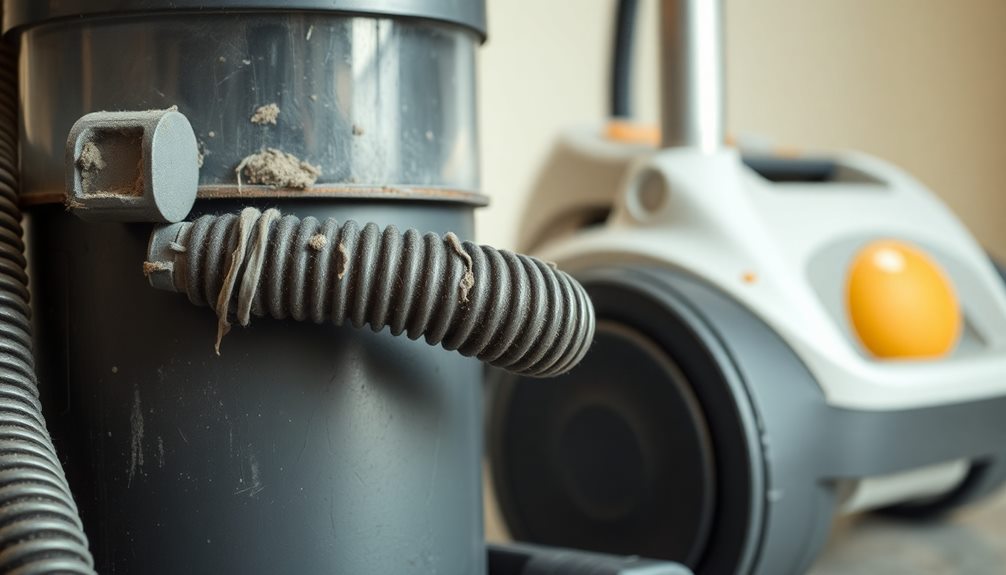
Regular cleaning and maintenance can keep your vacuum smelling fresh, but sometimes it's just not enough. If you're dealing with bad smells or performance issues, it might be time to replace your vacuum.
Here are some signs to watch for:
- Persistent odors remain even after thorough cleaning.
- The motor emits a burning smell or shows signs of overheating.
- Your vacuum has exceeded its recommended lifespan of 8 to 10 years.
- Repair costs for significant issues, like motor damage, exceed the cost of a new vacuum.
- You notice a significant loss of suction power, despite replacing filters and bags.
If you check any of these boxes, don't hesitate to invest in a new vacuum cleaner. Ignoring these signs can lead to further frustration and ineffective cleaning.
A vacuum that can't perform well will only compound your issues with odors and cleanliness, leaving your home less than fresh. By replacing your vacuum at the right time, you guarantee a cleaner, healthier living space without the hassle of persistent odors or diminished performance.
Frequently Asked Questions
How Do I Stop My Vacuum From Smelling Like a Dog?
To stop your vacuum from smelling like a dog, regularly empty the bag or bin, clean the filters, and use baking soda to neutralize odors. Don't forget to clean the brushes and hoses frequently!
Why Is My Vacuum Making a Smell?
If your vacuum's making a smell, check for clogs, dirty filters, or a full dustbin. It might also have moisture inside or a worn belt. Regular maintenance keeps it running smoothly and smelling fresh.
How to Keep a Bagless Vacuum Smelling Fresh?
Did you know that 70% of vacuum issues stem from clogged filters? To keep your bagless vacuum smelling fresh, empty the canister regularly, clean the filters monthly, and consider adding baking soda or essential oils for fragrance.
What Can I Put in My Vacuum to Make House Smell Good?
To make your house smell good while vacuuming, try adding baking soda, essential oils, or a scented dryer sheet to your vacuum. You'll enjoy a fresh aroma every time you clean your floors.
Conclusion
In the battle against unpleasant vacuum smells, a little maintenance can go a long way. While mechanical issues may cause frustration, regular cleaning and troubleshooting can turn your vacuum from a source of odor into an ally in freshness. By embracing deodorizing techniques and knowing when it's time for a replacement, you can enjoy a clean home without the stench. So, don't let foul odors linger—take action and breathe easy with every sweep!
